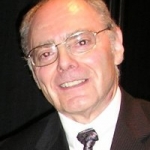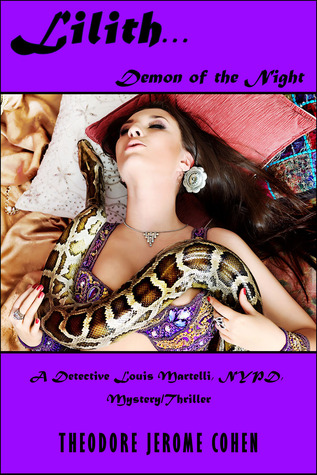Author: Theodore Jerome Cohen
Title: Lilith: Demon of the Night
Publisher: TJC Press
ISBN: 9780984920907
Pages: 242 (print length), Kindle, EPUB, PDF
Genre: Suspense/Fiction
Author Interview with Theodore Jerome Cohen
 Author Interview Theodore Jerome Cohen
Author Interview Theodore Jerome Cohen
Lilith – Demon of the Night
Hello again Ted and thank you for joining us to talk today about your latest book, Lilith – Demon of the Night, continuing the Detective Louis Martelli series.
TJC: Hi, Gary. It’s nice to be with you again.
PBR: At first I thought the book would be hard for readers to keep a serious frame-of-mind, with the overtone of vampirism throughout the book, but you kept true to the characters and used the “ridiculous” beliefs as being something the NYPD wanted to avoid exposing. Tell us, please, how you view the balancing of the macabre and reality of modern day police work, and how you chose to underplay the bizarre aspects.
TJC: There’s no question that vampirism is about as bizarre as it gets. And yet, as you know, you can find crimes associated with it cited in recent criminal case history. So, for me, it was simply a matter of treating what happens in the novel pretty much as I would any other crime I have written about. I did this by using factual presentations and catchy dialogue punctuated with graphic details. But . . . I wanted to stay true to myself. Which is to say, you know that all of my novels are a blend of truth and fiction.
PBR: Tell me about it!
TJC: I didn’t say it would be easy to separate the two. But, in Lilith, I wanted to make sure I didn’t stray into fantasy. To do so, I think, would have destroyed the entire ‘Martelli’ character and storyline . . . perhaps even the series. And it would have made me very uncomfortable. I do notwrite true fiction, but rather, enjoy taking something real and, shall we say, ‘embellishing’ it by taking it down new and different paths. So, to balance the macabre with the reality of modern day police work, as you put it, I used the pretext of the police not wanting the story unfolding in the media. This allowed me to downplay the sensationalism, to keep a lid on things. It allowed me to focus on police procedures and, more specifically, on Martelli’s and O’Keeffe’s work.
PBR: Martelli teams up with O’Keeffe for this novel. Tell me a bit about how you view their relationship. Where does it go from here?
TJC: That’s a very good question. I got beaten up by Marty Shaw from Reader Views when he reviewed my last Martelli novel, House of Cards: Dead Men Tell No Tales.
PBR: I reviewed that as well, Ted, and thoroughly enjoyed it. What was his beef?
TJC: Well, Marty loved the novel, too, but he felt O’Keeffe should have had a ‘beefier role.’
PBR: It certainly looks like you took Marty’s comments to heart.
TJC: Absolutely. One of the greatest things about being a novelist is being able to create characters out of whole cloth, and once created, breathe life into them. And so it was with ‘Sean O’Keeffe.’ For all intents and purposes, neither of the two earlier Martelli novels said much of anything about the man. All readers knew about him was that he was Martelli’s partner, was a pretty sharp guy, and, to Martelli’s benefit, was a great shot with a handgun. Beyond that, his life was a mystery.
PBR: But after reading Lilith, he’s a mystery no more.
TJC: Right you are. I think readers will enjoy learning about his past and how he came to be the person he is. In some ways, he’s Martelli’s alter ego, but in other ways, the two have much in common. It’s clear that they care about each other and, importantly, work well as a team. They’re both reckless to some extent, but in different ways. And that makes writing about them fun because I can place them in situations where they ‘work’ off each other.
PBR: I liked the references you made to your other books on vampirism within the story. What were your thoughts when you brought up this type of dialogue when writing the scenes?
TJC: The references, in these particular cases, were added for several reasons, not the least of which were to add credibility and embellish the storyline. But they also dropped as clues, so perhaps that’s where we should leave it. As for dialogue, I thoroughly enjoy writing exchanges between and among people. Dialogues between Martelli and Missy Dugan, the NYPD’s Senior Information Technology Specialist, are among my favorite, as are those between Martelli and his wife, Stephanie. And in Lilith, of course, several exchanges between Martelli and O’Keeffe left me laughing at the keyboard.
PBR: Your research into police policies and procedures is very impressive. How did you learn so much about the law enforcement “industry?”
TJC: an expert today. You have to remember you’re talking with someone who’s been watching detective and private eye shows on television since 1948! I mean, I was watching shows like Boston Blackie – “Enemy of those who make him an enemy, friend of those who have no friend” – before you were a gleam in your father’s eyes. And even before that, I’d listen to radio shows such as Gang Busters. These days, I love watching CSI Las Vegas and NCIS. Now, these are all fiction, of course. So, for real ‘ground truth,’ Officer Sy Nankin of the Essex County (NJ) Sheriff’s Department keeps me on the up and up. He has read all of the Martelli books and has provided me with the ‘fine tuning’ I needed in certain areas to ensure the police procedures are portrayed in a more realistic light than I might otherwise show them if left to my own devices.
PBR: The way the “perp” was found was truly a slow, methodical effort of many talented investigators. How do you envision the advances of CSI, biometrics and computer data bases will affect our society over the coming decade?
TJC: It’s going to be stunning. Look at how genetics changed the whole area of forensics. The problem, of course, will be the need to educate the public on the new technologies employed and build the basis for acceptance. Without an educated public . . . one that accepts what science has to offer . . . the ability to employ new technologies in the prosecution of crimes will be hampered in the courtroom.
PBR: What’s next for our favorite detectives?
TJC: I have no idea. Seriously. I literally don’t know what I’m going to write about until I wake up one morning and say, ‘Hey, this or that might make an interesting storyline.’
PBR: Is that what happened with Lilith? I mean, what in the work triggered a story about vampires, other than the fact that we seem to be bombarded these days with all sorts and manner of vampire books and films, the Twilight Saga, perhaps, being the best known?
TJC: Actually, I was exchanging e-mails with Irene Watson of Reader Views one morning last November regarding book sales. I had noted that sales for House of Cards had not reached the level that the sales for Death by Wall Street had reached when it first was released. We thought it might be the result of two factors. First, there are a ton of new books released every year—perhaps a million or more in 2011—so competition is great. Second, in case you haven’t noticed, the economy isn’t exactly flying high.
PBR: You don’t have to tell me.
TJC: Anyway, Irene says, ‘What you need to do is write a teenage vampire romance novel. That’ll sell.’ And I’m thinking, ‘Right.’ But then, I knew of one or two cases of real vampirism that had appeared in the press, and I got to thinking: “Why not to a Martelli book based on a vampire cult in New York City.”
PBR: And that was it?
TJC: That was it! And here we are.
PBR: We wish you the best of success, as always, and look forward to much more from your prolific keyboard. Happy New Year to you and your family from all of us.
TJC: Happy New Year to you, Nicole, and Sophia, as well, Gary.
(This book contains Adult language)



Follow Us